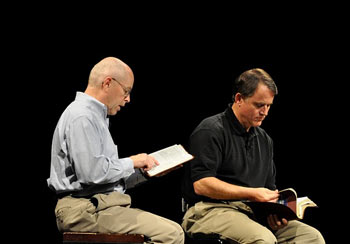 In this 8-1/2 minute video from last year's Clarus Conference, my friend Wayne Grudem and I share about what is encouraging and what is discouraging about the American church.
In this 8-1/2 minute video from last year's Clarus Conference, my friend Wayne Grudem and I share about what is encouraging and what is discouraging about the American church.
Wayne shares about being encouraged by young pastors with young congregations that are growing, and by the genuine worship he sees happening in churches. Wayne also talks about his concerns over a lack of extended prayer in Christian circles, and about Christian publishers publishing books that are spreading misleading and harmful doctrine.
What Is Encouraging and Concerning in American Evangelicalism? from Randy Alcorn - EPM on Vimeo.
To me, one thing that’s encouraging in the American evangelical church today is that I see a lot of believers thirsting for and seeking after God. This next generation of young people in their twenties and early thirties truly want a close relationship with Christ. They want to honor Him and invest their lives in things that really count and matter.
On the discouraging end of things, I think we live in a culture that is saturated with entertainment options. Young men are growing up being consumed with video games and other media outlets that have become substitutes for reading. There is a functional illiteracy rate in our culture, meaning these young people can read, but they don’t—they read Facebook but don’t read anything serious.
I’m concerned that there are many young people growing up—and particularly many young men—who, because they are not readers, will not be readers of God’s Word. One day they will be leading our churches, and many of them will not know the Scriptures.
I would say my own home church, which we started back in 1977, would probably score in the 90th percentile of Bible-teaching churches when it comes to Biblical literacy. I know we would be much better than average. Yet the level of biblical knowledge among our church body has, in these 33 years, steadily declined.
That is a source of great concern for me, and I think this problem is reflected in the way people live, and certainly in the way that they think. At the beginning of our church, a Christian worldview was much better established in many people’s minds than it is in the mind of the average attendee today. Sadly, that is the case.
There are still people who are studying and hungering for God’s word. That’s encouraging and good. But there are also a lot of people who are not studying and reading. That is certainly discouraging.
Do you have any suggestions as to how we can improve Biblical literacy in our churches?
 I think it must be deliberate. For instance, a great idea would be for a church to have a theology conference and say to its body, “Look. Here are some good books—let’s read them.” I would encourage churches to have reading groups. A church with small group Bible studies could require the study leaders to go through Wayne Grudem’s Bible Doctrine.
I think it must be deliberate. For instance, a great idea would be for a church to have a theology conference and say to its body, “Look. Here are some good books—let’s read them.” I would encourage churches to have reading groups. A church with small group Bible studies could require the study leaders to go through Wayne Grudem’s Bible Doctrine.
Churches could have incentives such as fasting from television for a month. (Of course, people would be lobbying for sports-related exceptions, but nonetheless you should do this!) The point is to say, “We as a church body are going to use this break from media in our families to read good, Christ-honoring books. We will have books on audio if you want to listen to them together as a family and discuss them. We’re making these books available to you. Let’s have a month without television—not because television is evil—but simply because it would be great to enjoy reading God’s Word and good books that take us to Scripture and ground us in our faith.”
After a church has done this for 30 days, then it’s likely many people will go back to watching television as much as they did before. But others will have discovered the joys of reading and of getting into interesting discussions. This will challenge them to move forward in their walk with God.
Photo by Timothy Eberly on Unsplash




